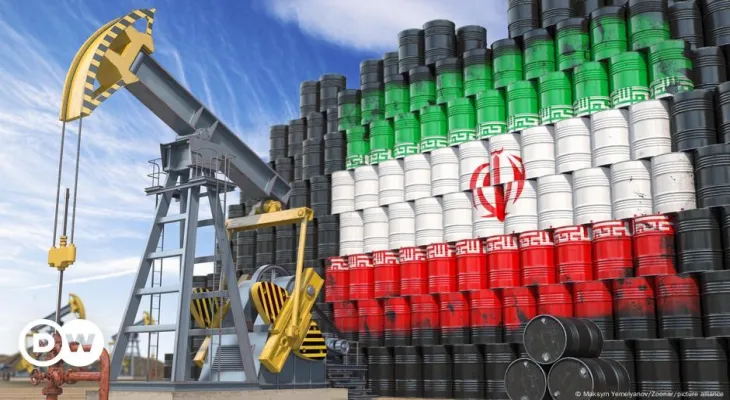Search here
Newspaper
Search here

Arab Canada News
News

Published: October 3, 2024
Amid fears of a widening conflict due to the Iranian strike on Israel, oil prices are headed upwards. How will this affect the global oil market and Iran's economy in particular?
The price of North Sea Brent and West Texas Intermediate crude oil rose by more than one and a half percent each on Wednesday (October 2, 2024), reaching $74.74 and $71.04 per barrel (1 barrel = 159 liters). This follows a rise of about 2.5 percent on Tuesday.
Israeli Prime Minister Benjamin Netanyahu announced his intention to respond to the Iranian attack, but without providing details. The American news portal Axios cited Israeli officials stating that the target of the Israeli response could be oil facilities in Iran and other strategic sites.
Experts from the analytical center "Capital Economics" wrote that "Iran produces about four percent of global oil supplies. The question now is: Will Saudi Arabia increase its production if Iranian supplies are disrupted?"
Oil Export Despite Sanctions
For Iran, oil exports are a crucial source of income for its economy. Although the United States withdrew from the nuclear agreement with Iran in 2018 and reimposed its sanctions on Iranian oil production, which have been expanded since then, Iran is still able to sell its oil abroad, especially to China.
In 2023, Iran's total oil exports amounted to "more than $35 billion," according to Iranian Oil Minister Javad Owji, as reported in the British Financial Times last March.
For the period from January to May 2024, the energy analytics company "Fortechsa" calculated an increase of 1.56 million barrels per day. Fortechsa noted at the end of June 2024 that Iran "managed to increase its exports by boosting crude oil production and increasing demand from China and expanding its dark fleet."
The "dark fleet," also known as the "shadow fleet," refers to camouflaged ships that smuggle oil and avoid sanctions. According to the American charity organization "United Against Nuclear Iran" (UANI), the Iranian shadow fleet consists of at least 383 ships.
The TV channel "Iran International," based in London, estimates that Iran sells its oil at a price 20 percent lower than the global market price, risking buyers being subjected to trouble due to American sanctions. The channel stated that "Chinese refineries are the main buyers of Iran's illegal oil supplies, which are mixed by intermediaries with oil supplies from other countries and are reported in China as imports from Singapore or other exporting countries."
Weakness of the Iranian Rial and Rising Inflation
Western sanctions do not only affect the Iranian oil industry, but also include international financial payment transactions with Iran. This has led to a collapse in the value of the Iranian currency, the rial.
Today, Iranians have to pay 580,000 rials for each US dollar on the black market. While the value of the Iranian rial was equivalent to one dollar for 32,000 rials after the signing of the nuclear program cessation agreement in 2015.
Sanctions and the deteriorating exchange rate are driving up the price of everyday goods — as Iran is not self-sufficient in securing its food needs. The inflation rate currently stands at about 40 percent.
Comparative Economic Power
Despite the stability of its oil export revenues in recent years, Iran is not an economically heavyweight country. Its population of around 88 million is about ten times larger than Israel's population (nine million). However, Iran's economic output in 2023 was about $403 billion, which was much lower than Israel's economic output of about $509 billion in the same year.
The differences become clearer when comparing the total value of all goods and services produced in one year, the Gross Domestic Product (GDP), per capita. In Iran, the GDP per capita last year was $4,663, while in Israel it exceeded $52,000, according to International Monetary Fund figures.
For the middle class, the economic situation has worsened considerably over the past two decades. "Due to sanctions, the standard of living in Iran has fallen to what it was 20 years ago," said Jawad Salehi Isfahani, an economics professor at Virginia Tech, in an interview with DW.
Corruption and Lack of Transparency
Much money seeps into the shadowy authoritarian structures in Tehran. In the Transparency International index, which measures levels of perceived corruption, Iran ranked 149th out of 180 countries. Israel ranked 33rd. For comparison: The United States ranked 24th and Germany 9th.
One of the main issues of lack of transparency in the economic realm is the file of the Revolutionary Guard and religious institutions, which control central parts of the economy. These entities do not pay any taxes and are not required to present public budgets.
Public Discontent in Iran
In Iran, the president is elected by the people, most recently in July 2024, but the country is not a democracy. Among the eighty applicants, the hardline conservative Guardian Council allowed only six candidates to run in the elections. The regime tries to buy social peace by subsidizing goods like food and gasoline. Despite all the repression, the ruling authorities seem to fear public discontent. Protests against the ruling regime have been recurring due to rising prices or the obligation for women to wear the hijab, for example, but not limited to.
A war with Israel would pose a heavy economic burden on Iran. This could force the government to direct most of its spending toward the military sector, which would increase resentment within the country.
Comments